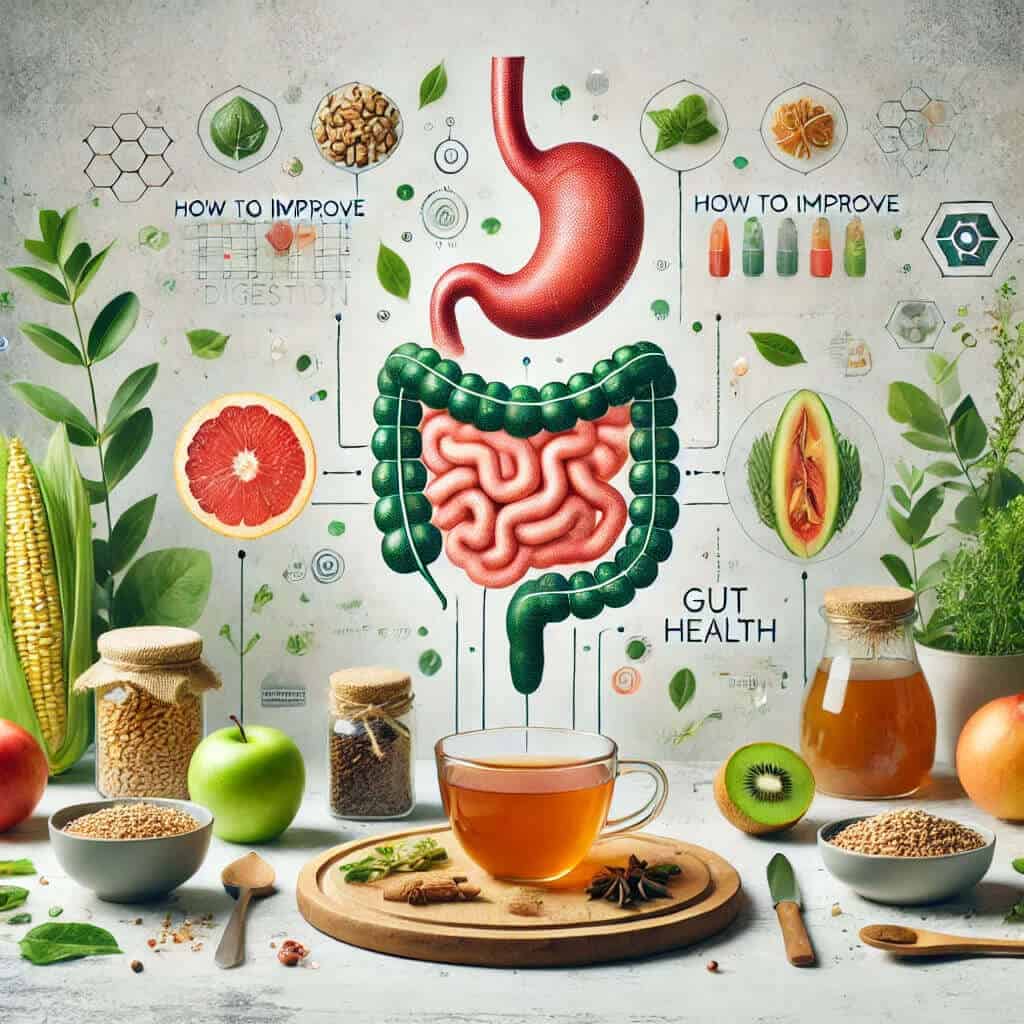Improved digestion is essential for general health. A healthy digestive tract is essential to our mood, energy levels, and immune system. On the other hand, problems like bloating and pain might result from inadequate digestion. Thankfully, there are a lot of natural ways to help with Better Gut Health. How to Improve Digestion post will discuss food suggestions, lifestyle changes, and practical methods for improving digestion.
1. How to Improve Digestion: Embrace a Fiber-Packed, Balanced Diet A fiber-rich diet is essential for optimal digestion. Constipation is avoided and regular bowel motions are encouraged by fiber. Fiber changes in two varieties: soluble and insoluble. Soluble fiber slows down digestion by forming a gel-like substance in water, but insoluble fiber gives feces more volume and speeds digestion.
Foods Rich in Soluble Fiber:
- Oats
- Apples
- Beans
- Lentils
- Berries
Foods Rich in Insoluble Fiber:
- Whole grains
- Nuts
- Seeds
- Vegetables like broccoli, carrots, and leafy greens
Incorporating a variety of fiber-rich foods into your daily meals can significantly enhance digestive function.Aim for 25-30 grams of fiber each day.
2. Keep Hydrated Water plays a vital role in digestion by dissolving nutrients for absorption and softening stool to prevent constipation. Drinking enough water throughout the day is essential for optimal digestive function.
Tips for Staying Hydrated:
- Consume at least 8 glasses of water daily.
- Start your day by drinking a glass of warm water to kickstart your digestion.
- Incorporate water-rich foods like cucumbers, oranges, and watermelon into your diet.
3. Practice Proper Chewing Chewing is the initial step in the digestion process and should not be overlooked. Thoroughly chewing your food breaks it down into smaller pieces, aiding in easier digestion in the stomach. Enzymes in saliva also begin breaking down carbohydrates.
Benefits of Chewing Slowly:
- Easier digestion
- Enhanced nutrient absorption
- Reduced bloating and gas
Take your time during meals and chew each bite at least 20-30 times. This simple practice can greatly enhance digestion.
4. Incorporate Probiotics and Prebiotics Probiotics are beneficial bacteria for gut health that help balance good and bad bacteria, improving digestion and immunity. Prebiotics are a type of fiber that feeds the good bacteria in the gut.
Sources of Probiotics:
- Yogurt
- Kefir
- Sauerkraut
- Kimchi
- Miso
Sources of Prebiotics:
- Bananas
- Onions
- Garlic
- Asparagus
- Leeks
Combining probiotics and prebiotics promotes a healthy gut microbiome, essential for digestion.
5. Manage Stress Levels Stress directly impacts digestion by slowing down the digestive process. Effective stress management can help prevent issues like indigestion and bloating.
Ways to Manage Stress:
- Practice mindfulness and meditation
- Engage in regular physical activity like yoga or walking
- Get enough sleep
- Spend time on enjoyable activities
Learning how to Improve Digestion and manage stress effectively can have a positive impact on Gut health.
6. Maintain Regular Physical Activity Exercise not only benefits overall health but also aids digestion by stimulating intestinal muscles and helping move food through the digestive system. Regular physical activity can also reduce stress, which influences digestive health.
Recommended Exercises:
- Brisk walking
- Cycling
- Swimming
- Yoga
- Pilates
Aim for at least 30 minutes of moderate exercise most days of the week to promote healthy digestion.
7. Opt for Regular, Smaller Meals Eating large meals can overwhelm the digestive system, leading to discomfort and indigestion. Consuming smaller, more frequent meals can help the stomach process food efficiently.
Benefits of Smaller, Frequent Meals:
- Less bloating
- Improved nutrient absorption
- Stable energy levels
Try to have 4-5 smaller meals throughout the day instead of 2-3 large meals for optimal digestion.
8. Limit Processed Foods and Sugary Beverages Processed foods high in unhealthy fats, sugars, and additives can disrupt digestion. They are also low in fiber, contributing to constipation. Sugary beverages like sodas and energy drinks can lead to bloating and imbalances in gut bacteria.
Learn how to improve digestion Healthier Alternatives:
- Replace sugary drinks with herbal teas or infused water
- Choose whole foods like fruits, vegetables, lean proteins, and whole grains over processed snacks
Reducing processed foods and sugary drinks can support a healthier gut and improved digestion.
9. Tune into Your Body’s Hunger Cues Eating when genuinely hungry and stopping when full can enhance digestion. Mindful eating can help prevent overeating and digestive discomfort.
Learn Hear how to improve digestion Tips for Mindful Eating:
- Eat slowly and savor each bite
- Avoid distractions like phones or TV during meals
- Listen to how your body feels before, during, and after eating
Practicing mindful eating can help you understand your body’s signals and avoid overloading your digestive system.
10. Explore Herbal Remedies Certain herbs can aid digestion and alleviate symptoms like bloating and indigestion. Herbal teas are a natural way to soothe the digestive tract.
Beneficial Herbal Teas:
- Ginger Tea: Aids digestion and nausea
- Peppermint Tea: Relieves bloating and gas
- Chamomile Tea: Calms the stomach and supports digestion
- Fennel Tea: Reduces bloating and promotes gut health
Incorporating herbal remedies like teas into your routine can be a simple yet effective way to support digestion.
In Conclusion, I Hope you Learn how to improve digestion involves a holistic approach incorporating balanced nutrition, lifestyle changes, and mindful practices. By integrating the above strategies into your daily routine, you can promote optimal gut health, reduce digestive discomfort, and improve overall well-being.






